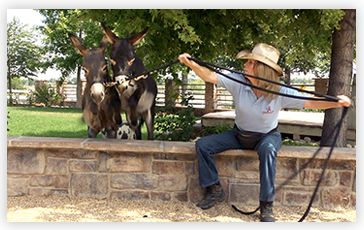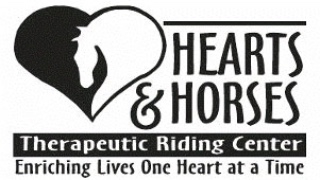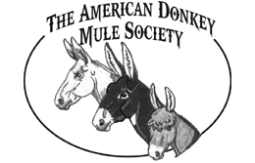| | |  | | |  | Dear Friends,
Finally! The weather is warmer and the spring rains have spread out enough to allow for some sunny days to engage in our yearly spring chores! All the haying equipment was checked and maintained, the fields were all fertilized and checked for sufficient moisture and the animals have been allowed turnout in the drier areas to promote growth in the grass turnout areas. Pasture and turnout rotation assures that we will always have adequate grazing for our equines throughout the summer and fall.
Our TMD Equine University students enjoyed a Mid-Term Webinar back in March, going over the specifics of my training technique. Although many of the techniques I use are relatively common—like leading training—in the webinar, I was able to discuss each phase of training in depth. The whole process should be easy and fun for both animals and their owners. Students learned how to integrate management and training practices so they fit together nicely like a jigsaw puzzle. Of course, just like a puzzle, you need to have all the pieces— if you don’t, the harmony in both management and training is obstructed.
Our current construction projects include excavating our dressage arena, building a new bathroom for our exhibition arena (and equipment barn area), and putting in a cement slab for bleachers to sit on when we have larger events here. The dressage arena required putting in a retaining wall between us and my neighbor to prevent the sand from washing away. I hope my neighbor doesn’t mind having Niagara Falls pouring into his fields when it pours down rain! I would assume not (he said as much)…free irrigation water!
The show season has going on in full swing right now! I was unable to attend Bishop Mule Days again this year because of the new challenges that caring for my geriatric champions and rescues bring. Bonnie Shields and I have been sharing a booth in the Home Economics Building for many years and she brought some of my products in the booth to sell this year even if I could not be there.
If you have been following our “What’s New?” section on the website, then you know that Roll is doing very well with his bout of White Line Disease. We did lose Lucky Three Calypso (28-year-old john mule) to a genetic intestinal twist, but I was happy to see him make it for this long. He was one of my own that had been sold as a three year old in 1991, and returned to me in 1999 at 11 with a blown out knee. We managed to get him sound and keep him that way until he passed. The YOUNGEST mules that were born here are now twenty and over. We continue their core strength and balance exercises and they are doing spectacular! They all look like 10 year olds!
Lots of people are taking advantage of our fun and educational tours. The ranch itself is really quite spectacular. We have a beautiful facility housing 23 equines of varying sizes and types of mules, donkeys and horses, museum exhibits and 17 life-sized Longears bronzes scattered around the ranch for people to experience who may not necessarily be interested in the live animals. I lead all tours and cover the educational end of all our management and training practices, so the tours are actually all personal clinics with me. If you are going to be in our neck of the woods, please do book your own personal tour! You won’t regret it!
Best Wishes and Happy Trails,
Meredith Hodges
| | | | |
|  | |
|
|  | |
|  | |  | |
|  | |  |
| |  | | Ask Meredith A Question | | | Have a question for Meredith or want to give us feedback? | | |
|  | |
| |
| |  | |  | | TMD EQUINE UNIVERSITY | | admission deadline
July 15 | | | All potential students need to submit their application and supporting materials by July 15, 2016 in order to join the Class of 2017. If you have any questions, send us a message or call. We look forward to seeing you in September! | | | |
|
|  | |
| |
|  | Training
Question | |  | | Question:
We have previously watched you show miniature donkeys and know your expertise is much respected. We have never shown here in Minnesota, but last year sold two foals to a lady who has been successfully teaching them tricks. She is wondering at what age can they start jumping? I know some weight-bearing activities should not be done until two to three years of age.
Answer:
Like human athletes, all equine athletes need to be prepared properly with feed and exercise over a long period of time for the activities they will be doing. The information below will explain the steps. Jumping is an advanced thing and should not be done until much later in their training program. In addition to the information given here, I would suggest that you read my series of articles about minis, titled “Getting Down with Minis," available on our website.
Although we begin our DVD series with Foal Training, you should always begin training with imprinting, no matter how old, and move forward from there with attention to feed as well. This will ensure a positive introduction and will help to build a good relationship with your mule or donkey. Our methods are meant to be done in a sequence and taking shortcuts or changing our method in some way will not yield the same results.
| | |
|  | From Our
Readers | | “I have a compliment to pass on to you. I sent your interview with the farm magazine to everybody I know who loves animals, especially donkeys and mules. My friend in Kusadasi, Turkey, was raised with them, as his family are farmers. They know and love their donkeys. He agrees with your article and wishes everybody with donkeys would follow your gentle and thoughtful method of training instead of being harsh and punitive with donkeys and equines. He also loved the picture with you and Lucky Three Zebulon’s Excalibur. He said both of you are ‘wonderful, beautiful!’ Even when he writes I can hear his Turkish accent! His English is the best I’ve come across while working with the Turks and he’s very educated but it’s still pretty thick. It makes me smile! You’re respected everywhere, even in far flung Turkey! God Bless.”
“The lunging tips were so helpful! I have had problems with my two 4-year-old horses when lunging, but now I know why! We will be getting a round pen at our house very soon and I will do lots of leading around until then. Thanks.”
“I want to thank you for taking the time to communicate with my daughter, Natalie. It would take too long to tell you her story, but having a mule in her life has been a huge positive change for her. Unfortunately, we are greenhorns with mules, and having your DVDs and personal time have meant the world to Natalie and her dad and me.
Thank you again.”
| | |
|
|  |
| |  |  | | _____________________________________________
| | | | 
Been a busy time on the Brass Ass this spring. And, speaking of spring, it came early and HOT there for a while. Gave all our flowers and fruit trees and grass a big head start and in this country, that could be fatal. Well, all the plant life survived the early spring, but our sweet Rocky mule didn't. He suddenly and out-of-the-blue laid down one sunny Saturday and quietly died! He was only 22, our youngest mule, and was in good health, as far as we knew. Saw him at 1 in the afternoon, eating new grass along the fence line with the two mollies and by chore time that afternoon, he was gone. A heart-breaker. We'd had him since he was 2 and he was a loving and good-natured fella and our last pack mule.
I continue to be involved in illustrating children's books, which is a kick to me. Am just getting a good start on Patsy Trigg's new story about her dogs and cats, and have just agreed to illustrate a story about a pack mule by a gal in Indiana. More on that as it develops.
New "partner" at Bishop Mule Days this year, as my buddy, Debi, was having shoulder troubles and she knows how much physical work is involved in Bishop. My latest vicktum was Dottie Yerkes from our chapter of Back Country Horsemen. She doesn't have mules, but has had horses a good bit of her life and when I asked her if she'd like to "do" Bishop with me, she durn neer ran me over saying YES. Luckily she survived!
So, short and bitter-sweet for this chapter of the newsletter. It is raining here right now and we are 500% grateful. It was already getting very dry and the specter of last summer's fires and lack of hay and grass was rising in our minds. But, we are "keeping our traces tight" and looking forward to some summer rides on Miss Iris.
Bonnie
|
|  | |
| |
|  | |  | |
|  |  | | | Jan Pollema | | | | Thompson School District at Hearts & Horses Full Day Pilot Program a HUGE Success!
The Changing Leads Program at Hearts & Horses has been working with Thompson School District middle schools since its inception in 2009. The success of this program has caught the attention of school district administrators and students from three different middle schools (Walt Clark, Bill Reed and Conrad Ball) had the opportunity to participate in a full day program at Hearts & Horses this spring. The Changing Leads program increases the likelihood that our participants will be functional members of society, by learning transferable skills to enhance personal, school, family and community relationships.
This program combined specific social and emotional learning (SEL) programming in conjunction with equine facilitated learning (EFL) to build on the success of the Changing Leads Program at Hearts & Horses. Student participants learned SEL skills both in the classroom and in the barn to increase self and social awareness, relationship skills, decision-making, and self-regulation. These skills were developed using activities explicitly designed to augment the riding and ground work sessions with the horses. For example, students were taught about the teenage brain and the neuroscience of emotions and cognition, then practiced skills of recognizing, understanding, and regulating those emotions in order to allow for cognitive appraisal and consequential thinking. Then in ground work and riding activities these skills were recruited in the exploration of trust, respect, planning, overcoming obstacles, and leadership.
The target population that the Changing Leads program works with is youth at risk. Many youth struggle with emotional, social or behavioral problems, truancy, poor academic achievement, poor self-esteem, show a lack of interest for academics and activities, have an addiction to electronic devices and express a disconnection from home and school. Students were selected from the various schools by their teachers and school support staff, considering each students’ need for additional support and education around affective education, as well as their likelihood to receive and utilize such instruction.
The students had their final graduation on May 24 and through tears, laughter and many hugs the kids said goodbye to their horses and volunteers who they developed powerful bonds with over the eight weeks. The following was a quote from one of the many volunteers who worked with this group: "My time spent working with the students, volunteers and staff at Hearts & Horses is always an exceptional experience. There is an "awakening" that takes place in the young people as they interact with each other and their equine partners. Shuttered bodies straighten and open. Down-cast eyes unveil, brighten, and crisply focus. Quiet, small voices lift and transform small words into big power. Each time I leave I know I have been witness to transformation in everyone involved. I wish every kid who needed a "leg up" could find their way to Hearts & Horses. "
The program was made possible thanks to numerous local and international grants, including The City of Loveland Human Service Grant and the Foundation for Global Sports Development and we hope to make this partnership with Thompson School District a permanent part of the schedule!
| | |
|  |  | | | Leah's Corner | | Hello to all from the Swamps of Home! (If you get that reference, you are in good company!)
Welcome to another season of "What happened to the weather patterns?" Here in Texas, we are once again having record rainfall. Not drought, copious amounts of rain. Six to twelve inches in two days in some parts. Road closures. House floodings. Water higher than the fencelines and horses standing on people’s front porches.
In situations like this, many people do not have the resources to evacuate all of their animals in one load. This can certainly be problematic! This is why you want to make sure you at least have a halter with a contact-tag on it for every animal. If nothing else, put a plastic key-tag in their mane (use a bread-wrapper twist tie) that has your name and phone number on it, in case the stock goes downstream. You will want to make sure you have photos and copies of your registration papers backed up (preferably on digital media such as a thumb drive) and stored in a safe place! You may need proof of ownership if your animals wander far afield!
Have that three-day overnight bag ready for each member of the family (dry set of pants, long and short-sleeved tops, light jacket, underwear/socks, basic toiletries, and at least three days’ worth of essential medicines. Emergency preparedness is often something we don't think about until it is too late!
Another reminder—know which of your local radio stations is the all-news channel. That way you can tune in and know about important road closures, storm warnings, other breaking news. As I type this in the middle of a busy town, I am listening to that station (for us, KRLD 1080). There are road closures due to high water all around. I have to take a relatively back-road route to get home, and there are two spots where water might be a problem. I'll have that radio going the whole way!
If you aren't flooding, but are still having lots of water, be sure and keep an eye on hooves and coats. Rain rot is really a fungus, but very wet conditions can make it worse. Consult your vet for any skin conditions you see on your animals. Hooves can get soft and not wear down properly in heavy mud, so trim as needed, or consider making a nice deep sand wallow where they can be out of the wet and mucky mud for a while.
Remember NEVER ever drive around a barricade to cross a road—especially if you are hauling precious cargo. You need extra time to slow down hauling a trailer, and a trailer can double the road hazard. Keep yourself and your loved ones—two- and four-legged—safe in these conditions! Please don't be a statistic!
I hope you are all safe and sound!
Leah Patton, office manager, ADMS
| | |
|
|  |
|  | |  | |
| |  | |  | | | | | LONGEARS LIMELIGHT
Wild Burro Wells
An amazing and educational phenomenaon! Are the wild burros REALLY a threat to our ecological environment? Should we REALLY be rounding them up and putting them at risk for abuse? Find out about a
new study that gives new perspectives on wild burro ecology.
| | |
|
|  | |
| |
|
| |
|